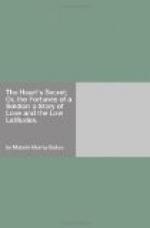“Sister?”
“Well, Ruez?”
“Captain Bezan loves you.”
“Perhaps so.”
“I say he does love you.”
“It is possible.”
“I say he loves you,” continued the boy, almost sternly.
“Well, brother, what of that?” she asked, with assumed indifference.
“It is that, sister, which has led General Harero to persecute him as he has done, and it is that which has led him like a noble spirit to turn to bay.”
A moment’s pause ensued.
“Is it not so, sister?” he asked, still looking keenly at her. “Have you not yourself intimated that Captain Bezan was to suffer owing to his interest and services for us?”
“You do indeed speak truly, brother,” said the lovely girl, breathing more quickly, and half amazed at Ruez’s penetration and prophetic manner of speech.
“Alas!” said the boy, once more relapsing into his former mood, “that he might be saved!”
“Has our father seen the governor-general, Ruez?” asked his sister, earnestly.
“Yes.”
“And to no effect?”
“None. Tacon, you know, is most strict in his administration of justice, and he says that if he were to pardon one such breach of military discipline as Captain Bezan as been guilty of, the whole army would at once be impregnated with insubordination.”
“Would that I could see Captain Bezan, if only for one single moment,” murmured Isabella Gonzales, half aloud, yet only to herself.
“Do you mean so, sister?” asked Ruez, catching quickly at his sister’s words, and with an undisguised expression of delight written upon his handsome countenance.
“Yes, no, brother, that is to say, if I could see him with propriety, you know, Ruez; that is what I meant to say.”
“Nothing easier, than for you to do so, if you desire it,” said the boy.
“Do you think so, Ruez?” said his sister, somewhat eagerly.
“Certainly, Isabella, my pass will serve for you with a trifling disguise.”
“But our difference in size; besides, you know that my voice—”
“Will not be noticed by those stiff sentries, or the turnkey,” interrupted the boy. “They do not know me at all, and would not suspect you.”
“Ah! but I can see many impediments in the way of one of my sex,” added Isabella Gonzales, with a deep sigh.
Captain Lorenzo Bezan awoke on the day previous to that appointed for his execution, with cheerful spirit. He found no guilt in his heart, he felt that he had committed no crime, that his soul was free and untrammelled. His coarse breakfast of rude cassava root and water was brought to him at a late hour, and having partaken of sufficient of this miserable food to prevent the gnawings of hunger, he now sat musing over his past life, and thinking seriously of that morrow which was to end his career upon earth forever. A strange reverie for a man to be engaged in a most critical period-the winding up of his earthly career.




